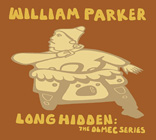Home » Jazz Articles » Album Review » William Parker: Long Hidden: The Olmec Series
William Parker: Long Hidden: The Olmec Series
Such an ambitious vision might be dismissed right away if offered by any other artist, but with Parker's compassionate and unassuming approach, it sounds so relevant and sensible that you begin to contemplate about other long-hidden threads that Parker may explore in future releases. An optimistic and humane musical vision like this deserves our deepest respect.
Long Hidden begins with Parker's spacious and resonant pizzicato playing of the gospel "A Balm in Gilead," which he recorded—playing arco—on Painter's Spring (Thirsty Ear, 2000) and describes in his liner notes as a meditation "on why we are here and what we have made of the world."
Parker relates that Don Cherry introduced him to the doson ngoni, which "made my heart sing," but the three tracks that feature this delicate instrument sound as if he's plucking a guitar or banjo in a much more gentle style than Cherry's hurried strumming. Parker describes these soothing tracks as "connected to the people sitting on the porch after supper... a suspending time of tuning and detuning dreams."
The Olmec Group features veteran saxophonist Dave Sewelson, associated with the Microscopic Sextet and his own Swelsonics, and bassist Todd Nicholson, a musical associate of violinist Billy Bang. This group's percussion-based tracks leave a lot of room for Sewelson and the young saxophonist Isaiah Parker to embark on stratospheric voyages. The longest track, "Pok-a-Pok," inspired by an Olmec ball game, anchors this release with its slow, percolating rhythms. The short call-and-response "Espirito" links all the musicians to magic and spirituality in its Latin-based gospel sensibility.
Two solo bass tracks were recorded live in 1997 in Berkeley, California. "Cathedral of Light" and "Compassion Seizes Bed-Stuy," a reprise of Parker's composition for his In Order to Survive quartet (Compassion Seizes Bed-Stuy, Homestead, 1995), are fantastic demonstrations of his soulful and measured arco playing. The bonus track, "In Case of Accident," contrasts the otherwise leisurely spirit of Long Hidden with a muscular fourteen-minute tour-de-force onslaught on the bass that leaves you breathless.
Track Listing
There is a Balm in Gilead; Long Hidden, Part Two; Codex; El Puente Seco; Long Hidden, Part Three; Cathedral of Light; Compassion Seizes Bed-Stuy; Pok-A-Tok; Espirito; Long Hidden, Part One; Bonus Track: In Case of Accident.
Personnel
William Parker
bassWilliam Parker: bass (1,6,7,11), eight-string doson ngoni (2,5,10). The Olmec Group (3,4,8,9): Dave Sewelson: baritone and alto saxophone; Isaiah Parker: alto saxophone; Luis Ramirez: accordion; Todd Nicholson: bass; William Parker: 8-string doson ngoni, percussion; Omar Payano: congo, guiro, voice; Gabriel Nunez: timbale, bongos.
Album information
Title: Long Hidden: The Olmec Series | Year Released: 2006 | Record Label: AUM Fidelity
< Previous
Concord Introduces Three Young Musici...
Next >
Crossroads
Comments
Tags
For the Love of Jazz
 All About Jazz has been a pillar of jazz since 1995, championing it as an art form and, more importantly, supporting the musicians who create it. Our enduring commitment has made "AAJ" one of the most culturally important websites of its kind, read by hundreds of thousands of fans, musicians and industry figures every month.
All About Jazz has been a pillar of jazz since 1995, championing it as an art form and, more importantly, supporting the musicians who create it. Our enduring commitment has made "AAJ" one of the most culturally important websites of its kind, read by hundreds of thousands of fans, musicians and industry figures every month.




















